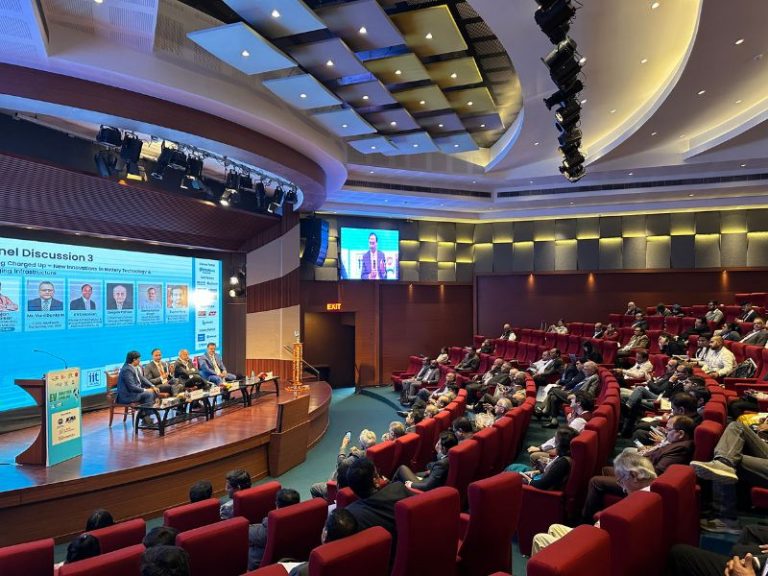Pan IIT Alumni and Alumni Associations of IIT (BHU) Varanasi host its first conclave
Addressing the demand, challenges and opportunities in the engineering, manufacturing and adoption of EVs, Pan IIT Alumni and Alumni Associations of IIT (BHU) Varanasi bodies organised, today ‘The Future Series, the EV Ecosystem Conclave’ in Delhi. The event witnessed experts from the entire e-mobility ecosystem, academicians and policy-makers at one platform discussing the relevance of EVs, innovations, adoption and challenges in the auto sector.
The event was supported by the Automotive Component Manufacturers Association of India (ACMA), IIT Delhi Alumni Association, PHD Chamber of Commerce and NASSCOM Centre of Excellence – IoT & AI. The conclave aimed to comprehensively understand the dynamics of the quickly changing EV Ecosystem and how EVs represents one of the most promising pathways to reduce carbon emissions and improve air quality across India. Understanding the challenges and exploring the concrete solutions, the experts looked to catapult the industry into the New Age Mobility. As India shifts gears to attain its ambitious climate change goal of 45% fewer carbon emissions and 50% electric power from non-fossil fuels by 2030, the conclave focused on driving growth and sustainability. (Source – PIB GoV)
Sanjeev Nikore, President, Alumni Associations of IIT (BHU) Varanasi, “India is investing heavily in the e-mobility shift. With an ambitious target to transition from Internal Combustion Engine (ICE) vehicles to electric vehicles, India has a rather herculean task ahead of itself. The Indian automotive sector is undergoing a rapid and robust overhaul – to propel the nation towards a greener future with minimalistic dependence on fossil fuels. This Conclave brings together the industry’s most influential minds who will share their insights and successes, discuss the challenges and opportunities of a sustainable future”
The Indian automobile sector ranks fifth globally and is expected to rise to third by 2030. India is the world’s largest producer of two and three-wheelers, the second-largest manufacturer of buses, and the biggest producer of vehicles like tractors. India’s automotive industry is worth around USD 222 Bn, while the EV market in India is estimated to be valued at USD2 Bn by 2023 and USD 7.09 Bn by 2025. Currently, the EV industry in India is at a nascent stage, which has open opportunities for auto players to develop efficient EVs for the Indian consumers. There are a total of 13, 92,265 EVs on Indian roads as on August 2022 (data by Ministry of Road Transport and Highways, India). By 2030, this will likely increase by 45–50 Mn EVs on the road. (Source – IBEF & Invest India)
With the global trends and evolution in the automotive industry, electric vehicles are becoming a boon. But there remain multiple challenges which restrict the Indian market from growing, and consumers are also ambivalent towards it. The experts in the conclave highlighted the utmost challenge – the cost of EVs. Compared to four-wheelers, two and three-wheelers have adequately captured the market in India, and consumers are too moving towards it. The lithium-ion battery plays a crucial role in EVs, it possesses almost half of the cost of EVs, resulting it to be expensive. Various panellists convey that importing the raw materials to develop lithium-ion batteries in India is one of the most significant factors in the high cost of EVs. Hence, it is essential to bring innovation in the battery, such as recycling lithium-ion batteries and extracting materials under expert guidance, which may further help reduce the cost of EVs.
“While the need for EVs is critical for a sustainable future there are many challenges – notably high cost of EVs and range anxiety among consumers due to slow pace of building the charging infrastructure. Also, there are challenges such as insufficient Service Stations, Skilled Manpower, less options as compared to ICE vehicles, and Battery manufacturing and cell testing at proper scale” said, Dr BK Panigrahi, Institute Chair Professor, Department of Electrical Engineering Head, Centre for Automotive Research and Tribology (CART), IIT Delhi.
Addressing the second challenge, the panellists at the conclave brought on the table the concern for efficient battery charging stations. The latest data states that 2477 EV charging stations in India are spread across 274 cities. Of these, Maharashtra has the highest number, with 538 charging stations, while Tripura has the least, with 1. It is imperative to build efficient and sufficient charging points as the demand for EVs are increasing in the Indian market. Also, the Government of India is aggressively promoting the need of EVs which plays a key role in reduction of carbon emissions. It is essential for government and battery manufacturing players to implement new innovation and technologies such as battery-swapping and must develop effective fast charging capabilities. (Source – CarDekho)
With every session, the panellists focussed upon the importance of EVs in India and how various auto players, industry experts and policy makers play a key role in making EV ecosystem sustainable.
The Central and State governments are bringing newer policies and incentives for the auto industry, battery manufacturers, and start-ups. For instance, the Delhi government has exempted road tax for all EV owners; other states are also stepping up to introduce several policies. In addition, the conclave also brings geopolitical and socio-economic dynamics, forcing markets to develop a local EV ecosystem. (Relook this) As customer demand rises, all EV components will likely achieve economies of scale; hence they require a robust supply chain to enable production lines to deliver more efficiently.
Debashish Bhattacharya, President, Pan IIT Alumni said, “The focus and drive to replace conventional vehicles based on fossil fuels is bringing about a radical transformation, the scope of which is huge. While this creates a very large opportunity that will play out for a long time, there are challenges in multiple dimensions. The obvious ones are battery technology, range, affordability and infrastructure. Also important are management of heat generated, ease of repair and replacement, as well as reskilling and upskilling, since the existing infrastructure will be redundant and people will require new skills to handle EVs and their aftermarket. The reskilling itself will cause a huge impact from a training infrastructure perspective and also a human perspective. Investments are expected to be to the tune of US $ 180 billion in the next 10 years, during which the market is expected to grow to almost USD 200 billion. The policies of the government need to be such that consumers can afford a EV, subsidy could be one of the policies. The implementation of such a transformation will require a very large canvas thinking, covering all possible dimensions. Geo politics could also create challenges, for example, the Ukraine war has resulted in Russia not supplying gas to Europe which has impacted their capacity to generate power, and therefore it seems Switzerland, followed by France and Germany, may enforce a ban on EV for the next few years as per a recent report. The implementation of the transformation, therefore, needs to be carefully looked into as well as policies that enable this transformation are the most critical pieces.”
With this conclave, industry experts and policymakers are bringing in various factors like challenges, innovation, battery technology and adoption, which significantly impact the e-mobility ecosystem. The panellists hoped that the GoI, policymakers and automobile industry will introduce a newer approach that will benefit consumers and substantially affect India’s economy.
















Add comment